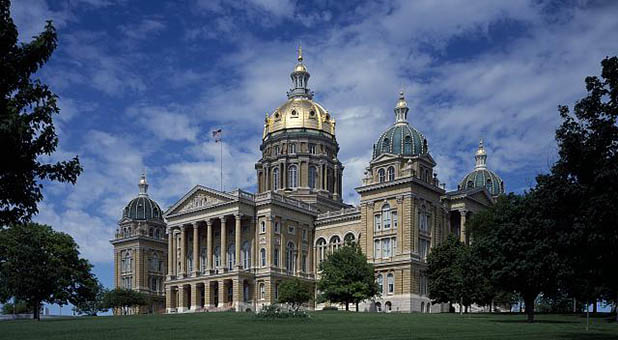State Tells Churches What They Can Teach About Sexuality
In 2007, the Iowa General Assembly enacted—with little fanfare—a new provision of the state’s Civil Rights Act that established sexual orientation and gender identity as “protected classes.”
And, for the next nine years, it was, more or less, a non-issue for most Iowans. But, with the Obama Administration’s push for full enforcement of “civil rights” for those engaged in what Christian teachings describe as sexual immorality, that law is coming back to the forefront in a major way.
The Iowa Civil Rights Commission has distributed a new flyer to a number of churches across the state that is meant to “educate” them about the Iowa Civil Rights Act and how it applies to them. To a casual reader, it may not appear to be a problem for churches, which have often pointed to their First Amendment protections.
But in a corner of the flyer, it states:
Does this law apply to churches? Sometimes. Iowa law provides that these protections do not apply to religious institutions with respect to any religion-based qualifications when such qualifications are related to a bona fide religious purpose. Where qualifications are not related to a bona fide religious purpose, churches are still subject to the law’s provisions (e.g. a child care facility operated at a church or a church service open to the public).
Wait. What?
That’s right. According to the Iowa Civil Rights Commission, a church service that is open to the public is not a bona fide religious purpose for which a church is exempted from the Civil Rights Act.
For starters, when was the last time a church service wasn’t open to the public? Secondly, while the flyer applies to “public accommodations,” it also references other forms of “illegal discrimination” that would fall under the ICRC’s purview.
This includes “harassment , intimidation, or other demonstration of hostility.”
The ICRC is supposed to be a neutral, fact-finding law enforcement agency. Its seven members are appointed by the governor, subject to confirmation by the senate. Staff, however, answer directly to the commission and act under its authority.
Commissioners serve four-year terms. Of the current commissioners, four have terms that expire June 30, 2017. The other three expire in 2019.
Neither the commission nor Gov. Terry Branstad have responded to requests for comment regarding the flyer as of this writing. In May, Branstad was heavily critical of President Barack Obama’s “transgender mandate” to public schools, which had effectively the same impact on public education.
So far, only two churches have responded to this new threat to their religious liberty. But Cornerstone World Outreach in Sioux City and Fort Des Moines Church of Christ are taking two entirely different approaches to reach the same goal.
Cornerstone World Outreach senior pastor Cary Gordon has obtained the legal counsel of First Liberty Institute, which sent a demand letter to the ICRC on Tuesday morning. In it, attorneys seek an exemption and a promise not to enforce the law against the church from the commission by no later than Aug. 4.
“I am a father of five, and I am deeply concerned that the State of Iowa would try to tell us, as a church, what we can teach about matters of sexuality and how we are allowed to ensure the safety and privacy of our children,” Gordon said. “All we want is to be left alone to teach the Word of God and minister to our community in peace.”
Fort Des Moines Church of Christ pastor Michael Demastus has taken his opposition to the flyer a step further and is actually suing the state for violating his church’s First Amendment rights. He has legal representation from the Alliance Defending Freedom.
“The commission is interpreting a state law to ban churches from expressing their views on human sexuality if they would ‘directly or indirectly’ make ‘persons of any particular…gender identity’ feel ‘unwelcome’ in conjunction with church services, events, and other religious activities,” the ADF said in a press release announcing the lawsuit. “The speech ban could be used to gag churches from making any public comments—including from the pulpit—that could be viewed as unwelcome to persons who do not identify with their biological sex.”
The lawsuit is called a pre-enforcement challenge, which means the ICRC hasn’t taken any action against Fort Des Moines Church of Christ. ADF Senior Counsel Steven O’Ban said all Americans “have the right to challenge unjust laws.”
“We don’t have to be punished or thrown in jail before we seek justice,” he added. “The government should never have the unchecked power to violate foundational, constitutionally protected freedoms.”














































